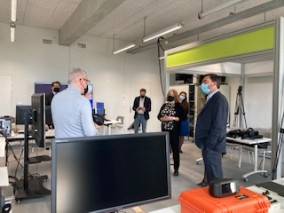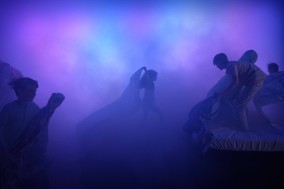The ARTS Institute is developing a partnership on research and training with the Faculty of Arts of the University of Ottawa.
« Entretiens Jacques Cartier » 2019 in Ottawa
A rapprochement between the Faculty of Arts of the University of Ottawa, Jean Monnet University, Lyon 2 University and ENS de Lyon led to the organisation of a meeting entitled “Dialogues and collaborations at the intersection of culture and technology” as part of the 32nd session of the « Entretiens Jacques Cartier ».
Shared creation between uOttawa theatre department and Ecole de la Comédie de St-Etienne
Following this meeting, a shared creation project, co-led by Sylvain Schryburt, professor of theatre at uOttawa’s Faculty of Arts and Duniemu Bourobou, director of studies at the Ecole de la Comédie, was proposed, which unfortunately could not be created because of the pandemic.
« Les entretiens Jacques Cartier » 2020 (virtual summit)
On November 4, 2020, Jean Monnet University, Lyon 2 University and ENS de Lyon with the University of Ottawa extended the cooperation initiated in 2019 by proposing a new meeting on the occasion of the 33rd session of the Entretiens Jacques Cartier entitled “Digital challenges and practices in cultural institutions : crossed views”.
Virtual meeting with uOttawa
Digital challenges and practices in cultural institutions: crossed perspectives
Virtual meeting organized as part of the 33rd session of the « Entretiens Jacques Cartier »
November 4, 2020.The rapprochement of the Faculty of Arts of the University of Ottawa, Lyon 2 University, Jean Monnet University and ENS de Lyon, initiated since 2018, resulted in the joint organization of a workshop at the EJC 2019 in Ottawa, entitled “Dialogues and collaborations at the intersection of culture and technology”.
This first workshop made it possible, among other things, to bring out a shared theme around the relationships between culture, digital technology and the arts that we wish to deepen together by focusing on digital practices and issues in cultural institutions.
The Lyon-Saint-Étienne site was particularly relevant for such a reflection, benefiting from diversified cultural institutions that have forged close links with universities or companies (for example, Lyon Municipal Library, Museum of Modern and Contemporary Art of Saint-Etienne, Saint-Etienne Municipal Archives, etc.).
Technological advances in the vast digital field have undeniably transformed practices within cultural institutions: massive digitization of corpora or collections, making available resources for research, pedagogy but also for the conservation and enhancement of unpublished archival collections. Meanwhile, digital devices have also transformed the relationship with institutional users.
Numerous studies had highlighted the effects of the digital revolution in these institutions. However, the meeting between these institutions, companies in the digital sector, academics in an international perspective brought a new perspective: practical, prospective and critical.
The project thus intended to be multidisciplinary and multisectoral, bringing together actors from institutional, cultural, public, private (companies and startups) and associations. The theme was at the crossroads of the cultural, academic and economic sectors. The project featured in the Digital and Technology chapter of EJC 2020.
The organized meeting allowed cross-fertilization between these different environments, able to spark new types of collaborations. The project generated new approaches that would not have been possible without this type of encounter between humanities and digital sciences in line with the major issues of our time.bilan. Since the pandemic, the cultural institutions have multiplied digital media, made resources available and thus reached new audiences. But it also requires a profound rethinking of both practices and uses, the relations between institutions and their public and the changes underway. All in all, the sharing of Franco-Canadian experiences and between different sectors proved to be fruitful both from a perspective of assessment and prospecting.
By questioning the new relationships to culture and knowledge that they create, the effects of structuring territories that they could make possible, the consequences on the training of pupils and students and the evolution of professions in these sectors, the project also contributed to the training of citizens, who were involved in the sessions, through open meeting moments, and their preparation to face the digital future.
Replay
The replay of this sequence can be viewed at the following address: https://www.youtube.com/watch?v=YKHDd7y7pwY&list=PLq8F8qXOC4tPtMGRuymjnFSalhabLOO0V&index=17
Welcome of a delegation from uOttawa’s Faculty of Arts in 2021
On October 12, 2021, Jean Monnet University welcomed Kevin Kee, Dean of the Faculty of Arts at the University of Ottawa, accompanied by Kelly-Ann Maddox, Senior Research Advisor, in the Manufacture campus to discuss future cooperation between the two institutions. It was the occasion for the ARTS Institute to present its activities and to provide an overview of the prospects for the cooperative agreement.

On this occasion, a visit to the IXR platform led by Philippe Colantoni (UJM / Laboratoire Hubert Curien) made it possible to consider tracks for cooperation on virtual and augmented reality.
Welcome of Anne-Marie Ouellet, visiting professor at the Ihrim laboratory in 2023
In January 2023, Anne-Marie Ouellet, professor of theatre at uOttawa’s Faculty of Arts, was welcomed as a visiting professor at the Ihrim lab. She intervened in the transversal seminar of the Master of Arts and in the professional seminar of the Master in Literature, occupations in cultural institutions. She also presented a conference entitled “Theatrical creation for and with children and teenagers : scenic devices, digital tools, aesthetic perspectives and ethical benchmarks” for the ARTS Institute as part of the Art-Enfance-Territoire 2022-2023 conference cycle (Learn more below).
Conference by Anne-Marie Ouellet
Meeting #4 scheduled as part of the Art-childhood-territory conference cycle 2022-2023.
January 25, 2023
“Theatrical creation for and with children and teenagers : scenic devices, digital tools, aesthetic perspectives and ethical benchmarks.”
Anne-Marie Ouellet talked about her recent creation : « La Chambre des enfants »

La Chambre des enfants – (c) Jonathan Lorange
This conference was moderated by Zoé Schweitzer (Ihrim / UJM).
Biography of Anne-Marie Ouellet
Anne-Marie Ouellet is a theatre assistant professor at the University of Ottawa and a stage writer. She is also the artistic director of « L’eau du bain », a company co-founded with Nancy Bussières and Thomas Sinou, which produces theatrical, performative and installation works. Their collective work of stage writing is based on the development of sensitive digital tools and close work with non-actors of all ages to offer exotic and intimate experiences for spectators of all ages. Their most recent creations are presented in various theatres (Canada’s National Arts Centre, Maison Théâtre) and festivals (Mois Multi, Carrefour international de théâtre de Québec, Festival TransAmériques, Big Bang d’Ottawa, Lille, Rouen and Music Labyrinth d’Anvers). In 2022, Anne-Marie Ouellet was named Emerging Scholar of the Year by the Faculty of Arts at the University of Ottawa.
To go further
Visit the website of her company « L’eau du bain »
Virtual meeting “Digital Cultures” in 2023
On January 26, 2023, Michel Depeyre, historian, and Pierre-Olivier Mazagol, geographer, spoke at the “Digital Cultures” conference series organized by uOttawa’s Faculty of Arts to present the 3D geovisualisation project of « the Gorges de la Loire ».